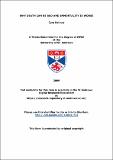Files in this item
Why death can be bad and immortality is worse
Item metadata
| dc.contributor.advisor | Mulgan, Tim | |
| dc.contributor.author | Kalnow, Cara | |
| dc.coverage.spatial | v, 118 | en |
| dc.date.accessioned | 2009-07-06T15:31:33Z | |
| dc.date.available | 2009-07-06T15:31:33Z | |
| dc.date.issued | 2009 | |
| dc.identifier.uri | https://hdl.handle.net/10023/724 | |
| dc.description.abstract | This thesis examines the moral implications of the metaphysical nature of death. I begin with the Epicurean arguments which hold that death is morally irrelevant for the one who dies, and that one should regard it accordingly. I defend the Epicurean claim that death simpliciter can be neither good nor bad from objections which purport to show that the negative features of death are bad for the one who dies. I establish that existence is a necessary condition for a person’s being morally benefited or wronged, and since death is the privation of existence, death cannot be bad for the person who dies. To account for the commonly-held belief that death is an evil, I explain that the prospect of death can be morally relevant to persons while they are alive as death is one of the many states of affairs that may prevent the satisfaction of persons’ desires for the goods of life. I claim that categorical desires ground a disutility by which death can rationally be regarded as an evil to be avoided and feared. I then consider an infinite life as a possible attractive alternative to a finite life. I argue that a life which is invulnerable to death cannot be a desirable human existence, as many of our human values are inseparable from the finite temporal structure of life. I conclude that death simpliciter can be neither good nor bad, but the fact of death has two moral implications for living persons: death as such is instrumentally good (it is a necessary condition by which the value of life is recognized); and our own individual deaths can rationally be regarded as an evil to be avoided. | en |
| dc.format.extent | 594309 bytes | |
| dc.format.mimetype | application/pdf | |
| dc.language.iso | en | en |
| dc.publisher | University of St Andrews | |
| dc.subject.lcsh | Death--Moral and ethical aspects | en_US |
| dc.subject.lcsh | BJ1409.5K2 | |
| dc.title | Why death can be bad and immortality is worse | en |
| dc.type | Thesis | en |
| dc.type.qualificationlevel | Doctoral | en |
| dc.type.qualificationname | MPhil Master of Philosophy | en |
| dc.publisher.institution | The University of St Andrews | en |
This item appears in the following Collection(s)
Items in the St Andrews Research Repository are protected by copyright, with all rights reserved, unless otherwise indicated.

